
2025-02-06 15:29
ОтраслевойThe role of education in economic development
#firstdealofthenewyearastylz
Education plays a vital role in economic development by providing individuals with the skills, knowledge, and competencies necessary to participate in the economy and contribute to its growth.
_Key Roles of Education in Economic Development:_
1. _Human Capital Formation_: Education helps to develop human capital, which is essential for economic growth. Educated individuals are more productive, innovative, and adaptable, leading to increased economic output.
2. _Increased Productivity_: Education enhances the productivity of the workforce, leading to increased efficiency and competitiveness in the economy.
3. _Innovation and Entrepreneurship_: Education fosters innovation and entrepreneurship, which are critical drivers of economic growth. Educated individuals are more likely to start new businesses, create new products, and develop new services.
4. _Reduced Poverty and Inequality_: Education helps to reduce poverty and inequality by providing individuals with the skills and knowledge necessary to access better-paying jobs and improve their socio-economic status.
5. _Improved Health and Well-being_: Education is linked to improved health and well-being, which are essential for economic development. Educated individuals are more likely to make informed decisions about their health and well-being.
6. _Increased Economic Growth_: Education is a key driver of economic growth. Studies have shown that a 1% increase in the average level of education in a country can lead to a 3-6% increase in economic growth.
_Challenges and Opportunities:_
1. _Access to Quality Education_: One of the major challenges facing many countries is ensuring access to quality education for all citizens.
2. _Relevance of Education_: There is a need to ensure that education is relevant to the needs of the economy and society.
3. _Investment in Education_: Investing in education is critical for economic development. Governments, businesses, and individuals must work together to invest in education.
4. _Lifelong Learning_: With the rapid pace of technological change, it is essential to promote lifelong learning and continuous professional development.
In conclusion, education plays a critical role in economic development by providing individuals with the skills, knowledge, and competencies necessary to participate in the economy and contribute to its growth.
Нравится 0

Faithy7356
交易商
Популярные обсуждения
Технический показатель
Розыгрыш Xiaomi Redmi Note 9 и 20-и VIP-подписок
Технический показатель
ВЫСКАЗЫВАНИЯ БАЙДЕНА ДАВЯТ НА ВАЛЮТЫ РАЗВИВАЮЩИХСЯ СТРАН
Технический показатель
Европа заключила совместный контракт на поставку ремдесивира для лечения COVID-19...
Анализ котировок
Китай: Индекс деловой актив. в сф. услуг Caixin PMI, Сентябрь, 54,8 п.
Технический показатель
Индия: Решение Резерв. Банка Индии по проц. ставке, 4%, ожидалось 4%...
Технический показатель
События предстоящего дня: "АЛРОСА" опубликует результаты продаж за сентябрь...
Классификация рынка

Платфоома

Выставка

Агент

Вакансии

EA

Отраслевой

Котировки

Показатель
The role of education in economic development
 Гонконг | 2025-02-06 15:29
Гонконг | 2025-02-06 15:29#firstdealofthenewyearastylz
Education plays a vital role in economic development by providing individuals with the skills, knowledge, and competencies necessary to participate in the economy and contribute to its growth.
_Key Roles of Education in Economic Development:_
1. _Human Capital Formation_: Education helps to develop human capital, which is essential for economic growth. Educated individuals are more productive, innovative, and adaptable, leading to increased economic output.
2. _Increased Productivity_: Education enhances the productivity of the workforce, leading to increased efficiency and competitiveness in the economy.
3. _Innovation and Entrepreneurship_: Education fosters innovation and entrepreneurship, which are critical drivers of economic growth. Educated individuals are more likely to start new businesses, create new products, and develop new services.
4. _Reduced Poverty and Inequality_: Education helps to reduce poverty and inequality by providing individuals with the skills and knowledge necessary to access better-paying jobs and improve their socio-economic status.
5. _Improved Health and Well-being_: Education is linked to improved health and well-being, which are essential for economic development. Educated individuals are more likely to make informed decisions about their health and well-being.
6. _Increased Economic Growth_: Education is a key driver of economic growth. Studies have shown that a 1% increase in the average level of education in a country can lead to a 3-6% increase in economic growth.
_Challenges and Opportunities:_
1. _Access to Quality Education_: One of the major challenges facing many countries is ensuring access to quality education for all citizens.
2. _Relevance of Education_: There is a need to ensure that education is relevant to the needs of the economy and society.
3. _Investment in Education_: Investing in education is critical for economic development. Governments, businesses, and individuals must work together to invest in education.
4. _Lifelong Learning_: With the rapid pace of technological change, it is essential to promote lifelong learning and continuous professional development.
In conclusion, education plays a critical role in economic development by providing individuals with the skills, knowledge, and competencies necessary to participate in the economy and contribute to its growth.
Нравится 0
Я тоже хочу высказать замечания.
Задать вопрос
0Комментарии

Пока нет комментариев, оставьте комментарий первым

Задать вопрос
Пока нет комментариев, оставьте комментарий первым